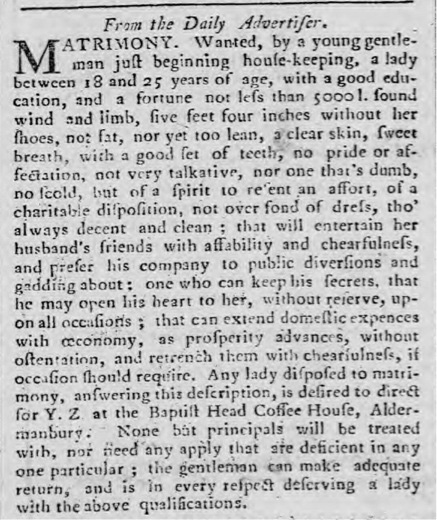Valentine’s Day is a day for love, passion and romance. When your research focuses on that most romantic of ages, the 18th century, you sometimes come across little snippets from the lives of starry-eyed lovers lost long ago, hidden away in Georgian newspapers. Take this personal ad placed by “A. B.” in Lloyd’s Evening Post from 9 December 1761:

[If a young Lady, who was at Aldgate Church last Sunday afternoon, and sat in the fourth seat from the pulpit, in a green hat, trimmed with white blond lace, a pretty large patch on her left temple, had on a silk gown, a short black capuchin, and a tippet, and went into a house in East-Smithfield with a Gentleman in a brown coat, will be so kind as to leave a line at the bar of the Jerusalem coffee-house, directed to A. B. mentioning the place of her abode, or where she may be spoke with, will ever be acknowledged as a great favour, and honour conferred on a gentleman who is deeply in love with her; has no other intentions but those that are honourable, and is obliged to take this method of making it known to the lady. If he does not hear from her he must languish in a deplorable condition.]
My friends were divided over A. B. when I first shared his ad on Facebook. Some found him rather sweet and heart-warming (one asked whether she could nab it for a short story). Others branded him a creepy stalker, possibly because of his, er, creepy stalking. It seems likely that A. B. was indeed one of these rakish rogues whom our conduct books are always warning us about, but I would dearly love to believe that his languishing was quite literal.
Unfortunately, the 18th century held no shortage of Mr Less-Than-Rights. Ruth Scobie has already picked out 10 “nice guys” of the 18th century who graciously informed the fairer sex of all that they had to offer in personal ads. Yes, for every Mr Darcy, there’s a Wickham and about a dozen Mr Collinses.
So let’s take a moment to look at a couple of choice Collinses, and remember what Georgian ladies had to put up with. The ad below is from the Caledonian Mercury, 8 August 1764. “Y. Z.” clearly believes that the best tactic for securing a match is specificity:

[MATRIMONY. Wanted, by a young gentleman just beginning house-keeping, a lady between 18 and 25 years of age, with a good education, and a fortune not less than 5000l. Sound wind and limb, five feet four inches without her shoes, not fat, nor yet too lean, a clear skin, sweet breath, with a good set of teeth, no pride or affectation, not very talkative, nor one that’s dumb, no scold, but of a spirit to resent an affront, of a charitable disposition, not over fond of dress, tho’ always decent and clean; that will entertain her husband’s friends with affability and chearfulness, and prefer his company to public diversions and gadding about; One who can keep his secrets, that he may open his heart to her, without reserve, upon all occasions; that can extend domestic expences with economy, as prosperity advances, without ostentation, and retrench them with chearfulness, if occasion should require. Any lady disposed to matrimony, answering to this description, is desired to direct for Y. Z. at the Baptist Head Coffee House, Aldermanbury. None but principals will be treated with, nor need any apply that are deficient in any one particular; the gentleman can make adequate return, and is in every respect deserving a lady with the above qualifications.]
Be still, my beating heart! To be fair, Y. Z. never specified whether the “good set of teeth” had to be the lady’s own; as long as you can rustle up some decent dentures from a handy orphan you may still be in with a chance.
For those Georgian gents who lacked the charm and eloquence that God so graciously bestowed upon Y. Z., help was still available. The New English Letter Writer of 1785 provided young beaux with handy templates of romantic epistles. How could any man fail to become a master of woo?
One of these letters was written by a sailor named Tom to his sweetheart Bett, which we can summarise into “three steps to a successful courtship”:
Step 1: Eliminate the competition (or “a bronze medal is still a medal”)

Step 2: Give her the life she’s always dreamed of
![]()
Step 3: Throw in a little something extra to sweeten the deal
![]()
…and boom! Matrimony!
You may well be wondering how anyone could possibly cope with being married to these monstrous macaronis. Not well, it would seem, at least according to the London Evening Post. On 15 November 1774, the paper printed a letter from “A Bachelor” lamenting the breakdown of modern marriage. As a postscript, the writer attached “a pretty nice calculation of the present state of wedlock in this country”:

So, married pairs in England – 872,564
Married pairs absolutely and entirely happy – 9
That many?!
Tim Worth is a PhD student at the University of Southampton researching Scotophobia in Britain and America in the 18th century. This is an edited version of a post that originally appeared on his blog.
Register to continue
Why register?
- Registration is free and only takes a moment
- Once registered, you can read 3 articles a month
- Sign up for our newsletter
Subscribe
Or subscribe for unlimited access to:
- Unlimited access to news, views, insights & reviews
- Digital editions
- Digital access to THE’s university and college rankings analysis
Already registered or a current subscriber?







